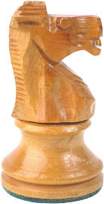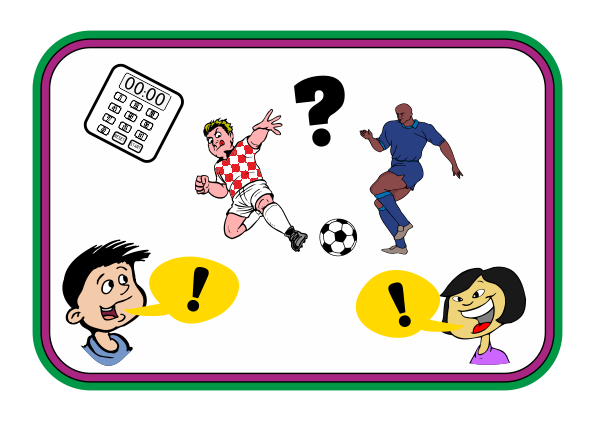
Every man is guilty of all the good he didn't do.
Voltaire (1694-1778)
World Cup Football 2018

Target:
Various
Age:
Elementary aged and up
Duration:
Around 6 minutes or more
Class Size:
Small groups
Energy Level:
Low to medium
Type:
Co-operative Board Game
Equipment:
Board and Cards (downloadable), timer, D6
Football
teamwork
luck
Goal!
teamwork
luck
Goal!
This board game is an example of a Co-operative Quiz. There are two methods of play, basic and advanced. Note the game mechanics are almost the same, the difference is in the English required.
Before the game can be played the board and playing cards must be downloaded, printed out and prepared. There are 16 cards: 3 player cards, 5 event cards and 8 ball cards. . You'll need something around 20mm diameter to represent the ball - a one yen coin will do and you will need a six-sided dice (D6) and a stack of flashcards for the players to name or make sentences about.
Set-up
- The Players decide whether to be red (Croatia) or blue (France). Team name can be changed if desired.
- Shuffle each deck of cards and keep them near the board face down.
- Decide on a duration for each half and set a timer accordingly.
- Place the ball on the centre spot for the kick-off.
Basic Game
- One player is selected to go first and given a flashcard to identify If the player is uncertain of the correct answer the player may pass the task to any other player.
- A player who correctly identifies the correct answer rolls a six sided dice and moves the ball forwards towards the target goal. Count each swathes of grass as one space. The card is put in a discard pile.
- If all the players pass the card is put to one side. Go onto the next card. Whenever there are three cards put to one side the referee goes through the cards, names them and shuffles them into the stack. The dice is rolled for the opposing team and the ball moved against the players
- If a player names a flashcard incorrectly the dice is rolled and the ball is moved backwards to the team's own goal. The correct answer is not revealed.
- If any player blurts out an answer when it is not his/her turn that is considered a foul and treated as a wrong answer. The dice is rolled and the ball moved backwards.
- If the ball ends in an empty swathe go onto the next turn.
- If the ball lands in a swathe containing an unmarked player the dice is thrown again and the ball moved accordingly. Sometimes the dice might get thrown two or three times for one move.
- If the ball stops in a swathe with two players then shuffle the three in-play cards and the player chooses one. If a tussle card is drawn proceed with the next turn. If an event card is drawn then shuffle the event deck and the player chooses an event at random. The events work as follows:
- Header. The dice is thrown for each team. Whichever team gets the lowest score gets to move the ball towards their target goal. The turn continues. A tie is treated as a tussle. Start the next turn.
- Throw-In: As for a header except the team can choose the result. For example, France roll a 3 and Croatia a 4. France could move the ball 1, 2, or three swathes in either direction. A tie is treated as a tussle. Start the next turn.
- Dribble: the next turn begins. The next player is on their own and can't pass. If the player passes put the card to one side and show the player the next card. Keep going until the player identifies a card or three cards have been put to one side.
- Clear: Roll the dice twice add the results and move the ball that number towards the other half. Play continues.
- Foul: A foul is followed by a free kick. Which ever team rolls the highest dice gets to move the ball that number of swathes towards their target goal. A tie is treated as a tussle. Start the next turn. Oh! If a team wins a free kick and the ball is in the penalty area then that's a penalty!
- Whenever the dice score is high enough to carry the ball over the goal line shuffle all the ball cards. A player is chosen to pull out one cards. There are eight possible results:
- Goal: The ball is moved back to the centre line and the game continues with the next turn.
- Penalty: The ball is placed on the penalty spot. Shuffle the ball cards (excluding the penalty and goal card). and deal out six cards face down behind the goal. One player takes the penalty (or acts as goalkeeper). The player chooses four scoring numbers and two saving numbers, removes those cards and then rolls the dice. For example the player chooses 2, 3, 5 and 6 as scoring numbers and then rolls a 4. The penalty has been saved! Turn over the ball card to see what happens next.
- Woodwork: Place the ball in the goal. This works in the same way as a penalty except that all the ball cards are used and two numbers can score.
- Corner: The ball is placed at a corner flag. This works in the same way as a penalty except that all the ball cards are used and only one number can score.
- Save: Roll the dice and move the ball away from the goal a matching number of swathes. Play continues
- Miss: A miss is followed by a goal kick.
- Goal Kick: roll the dice twice, add the result and move the ball up the pitch away from the goal. Play continues.
- Scramble: first shuffle the ball cards and pull one out. If this is the goal card then a home goal has been scored! If not then roll the dice once and move the ball away from the goal and then once more back towards the goal. If the ball goes over the line then there is another scoring opportunity other wise play continues.
- At half time rotate the board 180 degrees. The referee decides whether to shuffle used cards back into the flashcard stack or not.
- Start the second half by rolling the dice against the players. As usual unmarked players cause the dice to be rolled again.
Advanced Game
- This plays as the basic game except that flashcards are not used and players take turns making sentences about a given topic. The referee counts the number of sentences. The count stops when 6 is reached or earlier if the referee judges there to be some kind of pause, horrible grammatical mistake or one player makes more than one sentence unless dribbling).
- Roll the dice. If the score is under the number of sentences move the ball in favour of the players. If it is over the number of sentences move the ball against the players. If there is a tie the players may choose how many swathes to move the ball (use the same rules as a throw-in)
- If a dribble event is chosen the next player cannot pass and keeps making sentences on their own.
Variations
- Before rolling the dice players must choose a tackle number. If the tackle number is thrown the ball is not moved (count the dice score as 0).
- After each goal or goal kick shuffle all the flashcards. This is especially good to do when using introducing new vocabulary.
- To roll the dice a player must use the word on the flashcard in a sentence.
- Rather than using flashcards create another task, for example answering or asking a question. Writing or spelling words
- Top Page
- Splog!
- Articles
- Games
- Across The Table
- Add One More
- Anaconda
- Be A Monster!
- Black Hole (board game)
- Bombs Away!
- Catch!
- Catch-Caught-Caught!
- Centipede
- Charades
- Co-operative Quiz
- Crocodile
- Dice Stack
- Fast Food Tag
- Find My Number
- Find The Penny
- Football
- The Happy Game
- Line Up!
- Maze Challenge
- Natty Narration
- Nose Nose Nose
- One Step Forward!
- Pair Fluency Match 7 - Death Wish
- Pair Fluency Match 7 - Go Green!
- Parrot Parade
- Passport Control
- Reach The Top!
- Snake
- SockIt!
- Tickle Time
- What Cards
- Which One?
- Whose Shoe?
- World Cup Football 2018
- You, You, Me!
- Wake Up
- Packs
- Sheets
- Songs and Music
- Strips (songs and otherwise)
- Stories
- Techniques
- Video
- Environment
- Japan
- The 75th Anniversay of the bombing of Hiroshima
- The 75th Anniversay of the bombing of Nagasaki
- Cars in Japan
- Coronavirus Olympics
- Forest Bathing
- Japan and the Summit
- Japan and World War Two
- Multiculural Japan?
- Olympics Two Tokyos
- Plastic in Japan
- Return to Fukushima
- The Anniversary too Important to Cancel
- Typhoon Jebi
- Yayoi Kusama's Infinity
- Other
- This Week In History
- January, February, March
- April, May, June
- Sub Menu Item
- This Week in History: April 8-10
- This Week in History: April 12-15
- This Week in History: April 19-24
- This Week in History: April 24-26
- This Week in History: May 6-11
- This Week in History: May 11-14
- This Week in History: May 18-23
- This Week in History: May 25-31
- This Week in History: June 1-5
- This Week in History: June 11-14
- This Week in History: June 22-27
- This Week in History: June 15-21
- This Week in History: June 29 - July 5
- July, August, September
- This Week in History: July 6-12
- Sub Menu Item
- This Week in History: July 14-19
- This Week in History: July 27-31
- This Week in History: August 2- 6
- This Week in History: August 17-21
- This Week in History: August 27-30
- This Week in History: August 31 - September 6th
- This Week in History: September 7-13
- This Week in History: September 22-27
- This Week in History: September 14-20
- This Week in History: September 28 - October 4
- October, November, December
- Quizes
- Vocab



